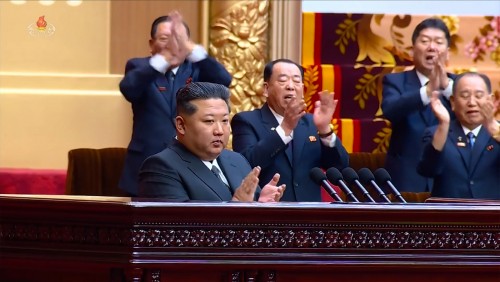 |
| North Korean leader Kim Jong-un addresses the Supreme People’s Assembly in Pyongyang on September 21, analyzing regional dynamics and declaring the government’s principled stance toward the U.S. and South Korea, according to Korean Central Television on September 22. / Source: Yonhap News |
North Korean leader Kim Jong-un signaled openness to meeting U.S. President Donald Trump, suggesting that dialogue could resume if Washington abandons its push for denuclearization. With Trump set to visit South Korea next month for the APEC summit in Gyeongju, speculation is rising over the possibility of a surprise meeting between the two leaders.
According to the Korean Central News Agency on September 22, Kim addressed the Supreme People’s Assembly in Pyongyang the previous day, saying, “I still personally have good memories of the current U.S. President Trump. If the United States discards its delusional obsession with denuclearization and recognizes reality to seek genuine peaceful coexistence with us, we have no reason not to face them.”
Trump and Kim last met in June 2019 at the inter-Korean border village of Panmunjom, when Trump made a surprise proposal via Twitter during his visit to Seoul. Since returning to office, Trump has repeatedly spoken warmly of Kim, signaling his willingness to meet again. During last month’s summit with South Korea, Trump remarked, “Kim Jong-un and I had a very good relationship, and we still do. I want to meet him again within this year.”
However, Kim’s insistence that Washington must abandon its denuclearization demand poses a major hurdle. Trump, who recently referred to North Korea as a “nuclear power,” has shown hints of flexibility, raising questions about whether he might adjust his stance to enable a summit.
Experts say Kim’s latest remarks are part of a calculated strategy to probe Trump’s transactional style. Im Eul-chul, professor at Kyungnam University’s Institute for Far Eastern Studies, noted that “whether Trump makes a decisive move will determine the resumption of summit talks, but without changes in Pyongyang’s firm nuclear position, a fundamental resolution remains unlikely.”
Yang Moo-jin, a professor at the University of North Korean Studies, added, “What Kim is signaling is that if the U.S. recognizes North Korea’s nuclear status and regime, Pyongyang will accept talks, while making clear that past-style denuclearization negotiations are off the table.”
Kim also lashed out at the Lee Jae-myung administration’s “three-step denuclearization plan,” dismissing it as a “copy of past leaders’ failed disarmament schemes” and declaring that the North and South are “two separate states that can never be unified.” This reinforced his stance against any inter-Korean negotiations.
In response, South Korea’s Unification Ministry said, “The government respects the North’s system and does not pursue any form of absorption unification or hostile acts. We will continue supporting dialogue between Washington and Pyongyang and work for lasting peace.” The ministry emphasized that Seoul would maintain a long-term approach focused on easing tensions, rebuilding trust, and fostering peaceful inter-Korean relations.
Most Read
-
1
-
2
-
3
-
4
-
5
-
6
-
7





















